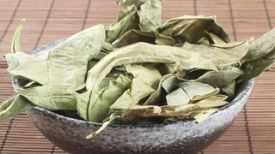Drug name: Cornus officinalis
Nickname: Shu jujube, Cornus officinalis meat
Source: "This Classic"
Classification: astringent drugs
Origin: Zhejiang, Henan, Anhui and other places
Sexual taste: Mild in nature, sour and astringent in taste
Meridian return: liver and kidney meridians return
Effect: Tonify liver and kidney, astringent and astringent
Indications: Dizziness and tinnitus, lower back and knee pain, impotence, nocturnal emission and slippery semen, frequent enuresis and urination, excessive menstruation, metrorrhagia, sweating and collapse, internal heat and thirst quenching
Character identification
This product is in an irregular sheet or pouch shape, with a length of 1-1.5cm and a width of 0.5-1cm. The surface is purple red to purple black, wrinkled, and glossy. Some have circular persistent sepal scars at the top, and fruit stem scars at the base, with a soft texture. Mild qi, sour, astringent, and slightly bitter taste.
Usage&Taboos
Internal administration: decoction, 6-12 grams; Or into pills or powder.
Taboos: Those who have a history of damp heat causing drizzling urine should avoid taking it.
chemical composition
The fruit contains Cornus officinalis glycoside, Ursolic acid, Moro Lonicera glycoside, 7-O-methylMoro Lonicera glycoside, Swertiside, and Muscovy turtle glycoside. In addition, there are also gallic acid, malic acid, tartaric acid, provitamin A, as well as saponins and tannins.
pharmacological action
1. The impact on material metabolism: Cornus officinalis has a significant anti adrenaline induced hyperglycemia effect, which can increase liver glycogen. Ursolic acid isolated from Cornus officinalis ether extract can significantly reduce blood sugar and urine sugar.
2. Anti pathogenic microbial effects: Cornus officinalis decoction can inhibit the growth of Staphylococcus aureus in vitro. The sour liquid obtained from fresh fruit flesh has an inhibitory effect on typhoid fever and dysentery bacteria, while the water extract has varying degrees of inhibitory effect on Trichophyton violaceus in vitro.
Chinese herbal formula
1. Treat five types of lower back pain, lower scorching wind cold, and weak waist and feet: one or two Ox Knee (removing seedlings), one or two Cornus officinalis, and three parts of Guixin. Apply medicine and pound Xiluo into powder. Before eating, mix two coins with warm wine. (Shenghui Fang)
2. To treat the deficiency of beriberi in the abdomen and lack of benevolence: eight liang of dried Rehmannia glutinosa, four liang each of Cornus officinalis and Dioscorea, three liang each of Zexie, Poria cocos, and Peony bark, one or two each of Guizhi and Fuzi (Pao), with eight flavors added. Finally, refine honey and make a large amount of Wan Wuzi. Drink fifteen pills of wine and take them daily. (Cui's Eight Flavored Pills in "Synopsis of the Golden Chamber")
Ancient book records
The Shennong Materia Medica Classic states: Master the evil energy in the heart, cold and hot, warm, dispel cold and dampness, and eliminate the three insects.
"The Treatise on Medicinal Properties": It is used to treat cerebral bone pain, stop irregular menstrual flow, nourish kidney qi, promote yang circulation, enhance essence, treat tinnitus, remove facial ulcers, promote sweating, and stop urinary incontinence in the elderly.
The Encounter of the Original Classic states that the detailed ability of Cornus officinalis to sweat should be attributed to its ability to control sweating. With its sour collection, there is no reason for excessive hair growth. The Zhongjing Eight Flavor Pill is used to cover the kidney qi and benefit from it. If it is used, it will be sealed and stored in a certain degree, and the liver yin will be nourished. If it is used, it will be able to relieve stress without any worries. The Yi and Gui are also of the same origin.
Traditional Chinese Medicine - Cornus officinalis
Release time:2024-06-08 13:42:34
Reading:221
Word Count:3817
Subscribe to email


